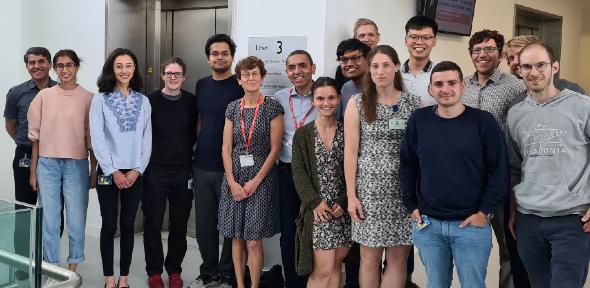
Submitted by Yolibeth López ... on Sun, 16/10/2022 - 10:47
BioNTech founders, Ugur Sahin and Özlem Türeci, visited Cambridge to give the annual Milstein Lecture at the Laboratory of Molecular Biology. During their visit, Sabila Chilaeva (BBSRC DTP 2019 Cohort) had the opportunity to have lunch with them. It was a unique and wonderful opportunity, one of the many opportunities that a PhD in Cambridge offers, and she shared her reflections with us.
"The experience still feels unbelievable - it brought home how two people, in the midst of global despair, found out how to develop a vaccine and how to do it at extraordinary speed.
Like many PhD students doing biomedical research, I chose this path with the hope of gaining a better understanding of the processes that go awry in diseases such as cancer, so that we can develop better treatments or cures.
Often, one begins their PhD with a lot of excitement but then realises the reality – research is slower than one would hope, with many unexpected challenges, and obstacles. The excitement can wane and the hopes that you entered the PhD can begin to feel like a distant dream. It was therefore a privilege to have the chance to speak with Ugur and Özlem and learn how they ensured that their ideas and hopes came to life.
Some of the key takeaways from our conversation were
- The importance of having a vision of what you want to achieve from the outset. Your plan may have to change and adapt as you get new information but keep the ultimate goal in sight. Ugur described the vision like a lighthouse that keeps you on course, which I really liked!
- Translation of research is an iterative process that requires not only applied research but also fundamental research
- The tremendous scope of knowledge beyond the science that was required from them including an understanding of supply chains, manufacturing facilities, patents and government organisations to name just a few
- You will not have all the necessary skills and it will be important to seek advice from experts in the field. However, is important to understand this advice so that you know if it is right for you. If it isn’t maybe it is time to do things differently
It also quickly became apparent during our conversation that Ugur and Özlem do not see their job as already done.
To quote César Milstein “Science will only fulfil its promises when the benefits are equally shared by the really poor of the world”
It feels particularly fitting that Ugur and Özlem gave this lecture as they have developed BioNTainers. These are like mini-factories that can be transported to countries that do not have their own vaccine manufacturing programmes so that they too can develop the vaccine and not rely on purchasing them from others. Plans are in place to deliver the BioNTainers to Rwanda and Senegal and this has been well received.
It also becomes apparent during our conversation that covid-19 has not distracted BioNTech from its original vision to develop mRNA vaccines for cancer. They shared some of their most recent results and it begins to feel that we have seen only the beginning of what mRNA vaccines and BioNTech will achieve!"

